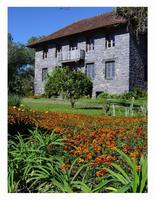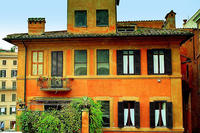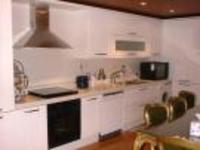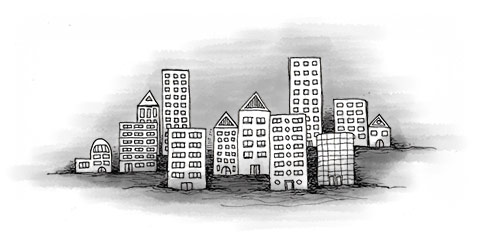The following advice is suggested by seasoned ex-pats:
- Sort out accommodation before coming to Italy if at all possible. A week of house hunting a month or two before you arrive can prevent months in a hotel.
- Ask the advice of people already in Italy as to the best towns/locations to live.
- Ask your colleagues to get you the free local newspaper in the towns you are interested as there is usually an accommodation section.
- Think about whether you want to live near to other ex-pats or not (they can be a great support network but you risk not integrating into Italian society)
- If you have children the location of the school (whether International/British school or Italian) will probably determine where you live.
- Write a good (but not too tight) brief as to the type of accommodation you want and send it to your relocation services company or local estate agents.
-
Revise the brief once you have had feedback/seen some places and then refuse to go to places that are way off the brief.

- Apart from agencies, the best way to find accommodation is either by word of mouth or by having a walk around the area you are interested in (notices of flats to rent or buy are often hung on gates of condominium or individual houses).
- When you view a house, check facilities nearby (bar, sports centre, nearness to town centre or motorway etc) and check on the map where you are.
- Check if there is a clause in the contract that the flat has to be painted once during your stay (there often is!). If so, get it painted before you move in (at least you can enjoy it!) rather than when you move out. The money is usually deducted from the deposit if you don’t.
- Many rented apartments have no fitted kitchen so allow 6-8 weeks to order and install. The kitchen is one of the most important rooms in the house for Italians & they find it strange that we would want to inherit someone else’s taste (also they often rent for 20 years not 2!).
- If your apartment is part of a block (condominium), you will pay upkeep costs (for heating & cleaning stairs, upkeep of gardens, salary of administrator) so check how much these are as well as monthly rent.
- Condominiums are often noisier than houses - apartments on the top floor are usually the quietest (and sometimes have bigger balconies).
- Get some legal advice to check the contract document before signing it (especially the length of stay as Italians rarely rent for only 2 or 3 years). Check also how much written notice you have to give to quit (verbal notice doesn’t count at all).
- Photograph the apartment including every little scratch on the wall etc when you move in so that there will be no (or fewer at least) controversies when you move out. This has nothing to do with Italians but everything to do with landlords!
- Rent is usually paid 3 months (may even be 6 months!) in advance + the deposit is usually 3 months rent so be prepared to pay 6 months (or even 9 months) rent up front.
- The finder’s fee for rented accommodation is split between the landlord and person wishing to rent.
- Once you have a flat in a condominium ask for the rules and ask someone to translate them for you. Breaking the rules (which are not always obvious!) may result in an official letter of complaint via the administrator. Usually it can be sorted out fairly equably but forewarned is forearmed!
- Remember that you are only going to be in this accommodation for a few years so it doesn’t have to be perfect – if you stick out for your dream house you may be in a hotel a long time.
Case study
John had been transferred to Northern Italy with his wife Carol and daughter Becky (18 months). Carol, who also works for a multinational company, had managed to organise transfer to their Milan office with the same timings as John’s move. This was great as they could move together and independently follow their careers.

Neither wished to live in a big city so they got the map out and identified a couple of potential smaller towns that were still within reasonable driving distance of work. The Italian companies agreed to give some help with finding accommodation (suggesting agencies, helping with translations, legal) but the major work would have to be done by Carol and John. Two months before their move they faxed a simple brief (translated into Italian by the company) to a couple of agencies, telling them that they would be in Italy in a particular week in July and asking them to organise a list of apartments to view. The brief simply stated that they wanted an unfurnished 3-bedroom apartment with largish living room and kitchen, 2 bathrooms, within easy walking distance of the centre of the town for a contract length of about 3 years. Additional extras (advantageous but not critical) were: garage, balcony, and park nearby. The agencies were told that they would not view any apartments that did not meet the brief.
As they would both work they also needed to find a nursery for Becky. A colleague in Italy recommended sending Becky to the state run nursery (asilo nido di comune) as they have a far better reputation and facilities than private nurseries (which surprised John and Carol). They arranged to visit a state run nursery and private nursery in the 3 towns that the agencies had organised apartments to view.
In July Carol and John left Becky with her grandparents and came to Italy for 4 days. John’s company agreed for someone to act as guide for them and they visited the various apartments and nurseries. They spent some time looking at the facilities in the area (town centre, parks, sports centres, nearness to motorway). On the basis of this they chose an apartment and registered Becky at the local state nursery.
There were 2 major problems to be solved:
- The apartment had no built in kitchen (which, they learned, is common in Italy).
- The nursery would only take Becky from September.
As they had a small child they were desperate to have accommodation organised before they came to Italy and without a nursery one of them couldn’t start work immediately. In the middle of all the discussions they also learned that Italy more or less closes down during August with everyone on holiday and this is a terrible time to move.

They then worked out the following solution: The landlord agreed to pay for the built in kitchen as long as the rent was increased slightly. The kitchen would belong to the landlord at the end of their stay. Carol and John chose the type of kitchen they wanted during their 4-day visit to Italy and it would be installed by the first week in Sept. Carol and John’s move was postponed until after the holiday period when both the flat would be ready and Becky could start at nursery.
The learning from this is that there is always a creative solution no matter how impossible the situation seems to be and that the Italians are really masters at this art!! When stuck it is always worth asking “but surely there is a creative solution to this?” Italians see this as a challenge and will nearly always come up with a way forward!
Useful vocab
Camere- bedrooms
Locali - bedroom +living rooms (so 3 locali means 1 living room and 2 bedrooms)
Soggiorno - living room
Cucina - kitchen – abitabile (fitted)
Servizi - services (bathrooms and if not mentioned elsewhere also kitchen)
Cantina - room in the basement (for storage)
Box - garage
Taverna - room (probably underground) – often used for parties!
Giardino - garden
Camino - Fireplace/stove
Balcone - balcony (often described as ampio (spacious)
100mq - 100 metres squared (total apartment size)
Letto - bedroom
Vendesi - for sale
Affittasi - for rent
By Helen Burgess, Insight Italy
Relocation and integration services
http://www.insight-italy.com/




